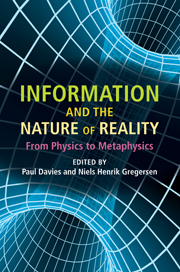Book contents
- Frontmatter
- Contents
- About the authors
- Acknowledgments
- 1 Introduction: does information matter?
- Part I History
- Part II Physics
- Part III Biology
- Part IV Philosophy and Theology
- 12 The sciences of complexity: a new theological resource?
- 13 God as the ultimate informational principle
- 14 Information, theology, and the universe
- 15 God, matter, and information: towards a Stoicizing Logos Christology
- 16 What is the ‘spiritual body’? On what may be regarded as ‘ultimate’ in the interrelation between God, matter, and information
- Index
- References
12 - The sciences of complexity: a new theological resource?
from Part IV - Philosophy and Theology
Published online by Cambridge University Press: 06 December 2010
- Frontmatter
- Contents
- About the authors
- Acknowledgments
- 1 Introduction: does information matter?
- Part I History
- Part II Physics
- Part III Biology
- Part IV Philosophy and Theology
- 12 The sciences of complexity: a new theological resource?
- 13 God as the ultimate informational principle
- 14 Information, theology, and the universe
- 15 God, matter, and information: towards a Stoicizing Logos Christology
- 16 What is the ‘spiritual body’? On what may be regarded as ‘ultimate’ in the interrelation between God, matter, and information
- Index
- References
Summary
A host of surveys indicate that what Christians, and indeed other religious believers, today affirm as ‘real’ fails to generate any conviction among many of those who seek spiritual insight and who continue regretfully as wistful agnostics in relation to the formulations of traditional religions – notably Christianity in Europe, and in intellectual circles in the USA. Many factors contribute to this state of affairs, but one of these, I would suggest, is that the traditional language in which much Christian theology, certainly in its Western form, has been and is cast is so saturated with terms that have a supernatural reference and colour that a culture accustomed to think in naturalistic terms, conditioned by the power and prestige of the natural sciences, finds it increasingly difficult to attribute any plausibility to it. Be that as it may, there is clearly a pressing need to describe the realities that Christian belief wishes to articulate in terms that can make sense to that culture without reducing its content to insignificance.
Correspondingly, there is also a perennial pressure, even among those not given to any form of traditional religiosity, to integrate the understandings of the natural world afforded by the sciences with very real, ‘spiritual’ experiences, which include interactions with other people and awareness of the transcendent.
Both of these pressures in contemporary life accentuate the need to find ways of integrating ‘talk about God’ – that is, theology – with the world view engendered and warranted by the natural sciences.
- Type
- Chapter
- Information
- Information and the Nature of RealityFrom Physics to Metaphysics, pp. 249 - 281Publisher: Cambridge University PressPrint publication year: 2010



